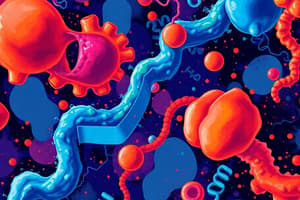Podcast
Questions and Answers
What is the primary reason humans belong to the kingdom Animalia?
What is the primary reason humans belong to the kingdom Animalia?
- They share traits with other animals. (correct)
- They are photosynthetic.
- They thrive in isolation.
- They share traits with plants.
What does taxonomy help in studying?
What does taxonomy help in studying?
- Evolutionary relationships between various forms of life (correct)
- Geological formations
- Weather patterns
- Political systems
What makes an ecosystem thrive according to the text?
What makes an ecosystem thrive according to the text?
- Interconnectedness and complex webs of dependency (correct)
- Absence of communities
- Lack of interconnections
- Isolation of elements
What does the study of ecology aim to understand?
What does the study of ecology aim to understand?
What benefits can analyzing ecological networks provide according to the text?
What benefits can analyzing ecological networks provide according to the text?
What is emphasized as a key element to exploring biology according to the text?
What is emphasized as a key element to exploring biology according to the text?
What are enzymes responsible for in cells?
What are enzymes responsible for in cells?
Which molecules form the foundation for life processes in cells?
Which molecules form the foundation for life processes in cells?
What is the primary role of DNA in cells?
What is the primary role of DNA in cells?
Why is taxonomy important in biology?
Why is taxonomy important in biology?
Which category enables us to classify organisms based on their shared characteristics?
Which category enables us to classify organisms based on their shared characteristics?
What is the primary function of cells in living organisms?
What is the primary function of cells in living organisms?
Flashcards are hidden until you start studying
Study Notes
Exploring Science 1: Biological Insights
Biology is an essential branch of science that uncovers the mysteries underlying life itself – from molecules and cells to ecosystems and evolution. As we delve into this fascinating field, let's consider some key concepts and discoveries within its diverse landscape.
Cells and Molecular Biology
At the heart of all living things lie cells. These tiny structures, invisible to our eyes without magnification, make up every organism. They are the building blocks and functional units performing tasks such as growth, reproduction, energy production, and maintaining homeostasis.
The molecules inside these cells, like DNA, RNA, proteins, and lipids, form the foundation for life processes. Enzymes, catalysts for cellular reactions, are proteins responsible for breaking down food, repairing damaged tissues, and synthesizing new materials. Genetic information stored in DNA guides the development of living beings through transcription and translation of genetic code into amino acid sequences that ultimately become proteins.
Organisms and Taxonomy
Diversity exists throughout nature. In biology, we classify organisms based on their shared characteristics using taxonomic systems. This categorization scheme enables us to understand relationships between species, identify patterns among them, and predict behaviors likely to occur across different groups. For example, humans belong to the kingdom Animalia because they share traits with other animals rather than plants.
Taxonomy has been instrumental in studying evolutionary relationships between various forms of life and documenting changes over time. It also provides insights into how biological elements manipulate their environment and shape ecological interactions critical to survival and adaptation.
Ecology and Ecosystems
Nature does not exist alone; it thrives on interconnectedness, where each element plays a role in sustaining balance and endurance. An ecosystem consists of communities of interacting organisms and their physical environments, creating complex webs of dependency and competition. The study of ecology seeks to understand these intricate connections.
From understanding food chains and cycles to assessing human impacts upon ecosystem health, ecologists explore ways to maintain equilibrium among organisms while ensuring sustainable usage of natural resources. By analyzing ecological networks, scientists can evaluate the effects of habitat fragmentation, climate change, pollution, and introduce possible conservation strategies aimed at protecting vulnerable habitats and preserving biodiversity.
Conclusion
As you embark on your journey exploring the wonders of Science 1, remember that understanding biology opens doors to countless questions, leading to groundbreaking discoveries and exciting revelations forming the backbone of modern medicine, agriculture, and environmental management. Embrace curiosity, appreciate complexity, and marvel at this beautiful tapestry called Life!
Studying That Suits You
Use AI to generate personalized quizzes and flashcards to suit your learning preferences.




